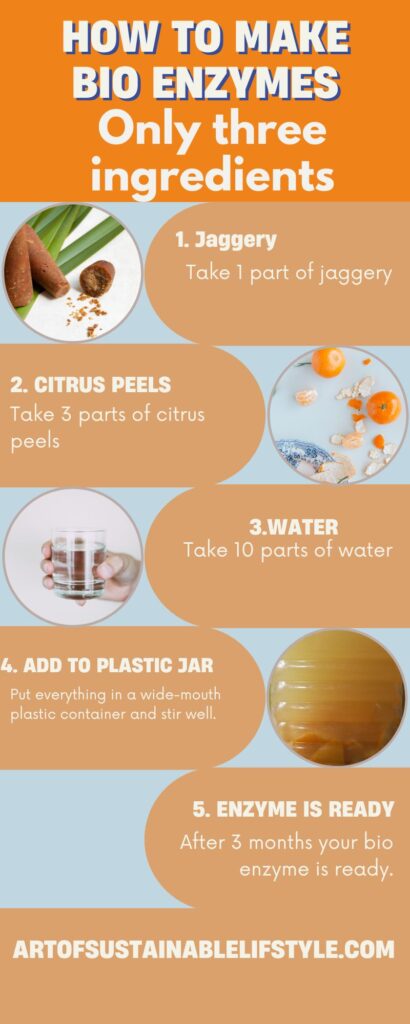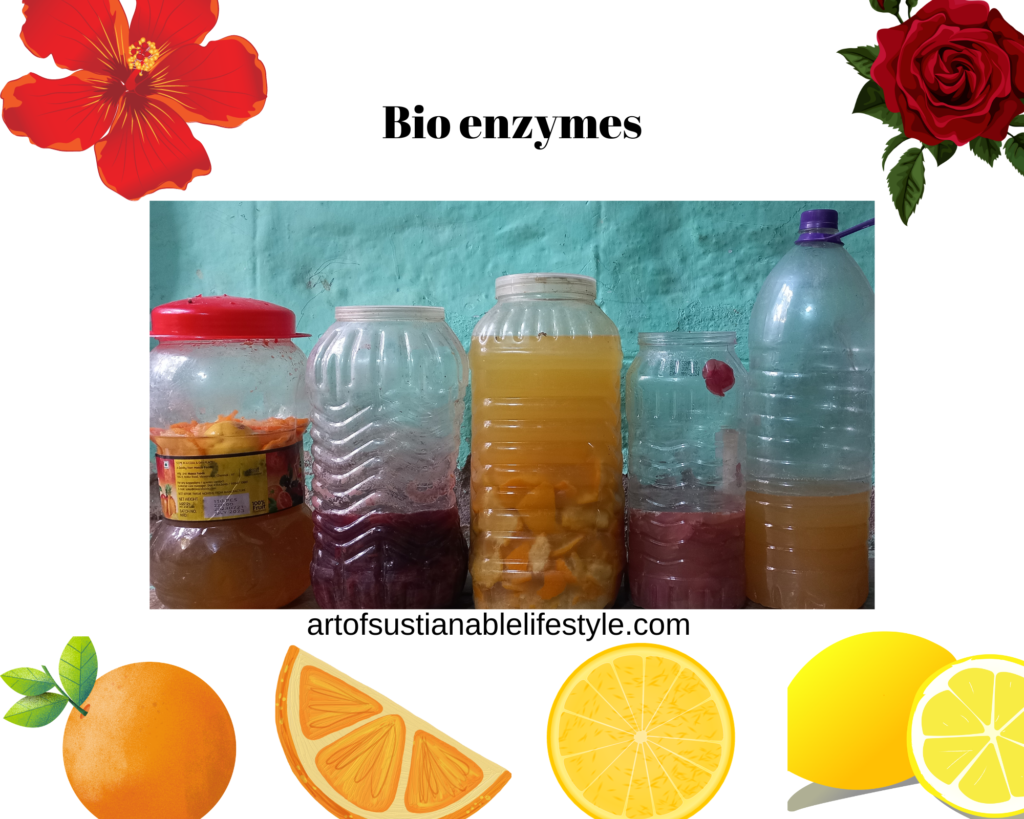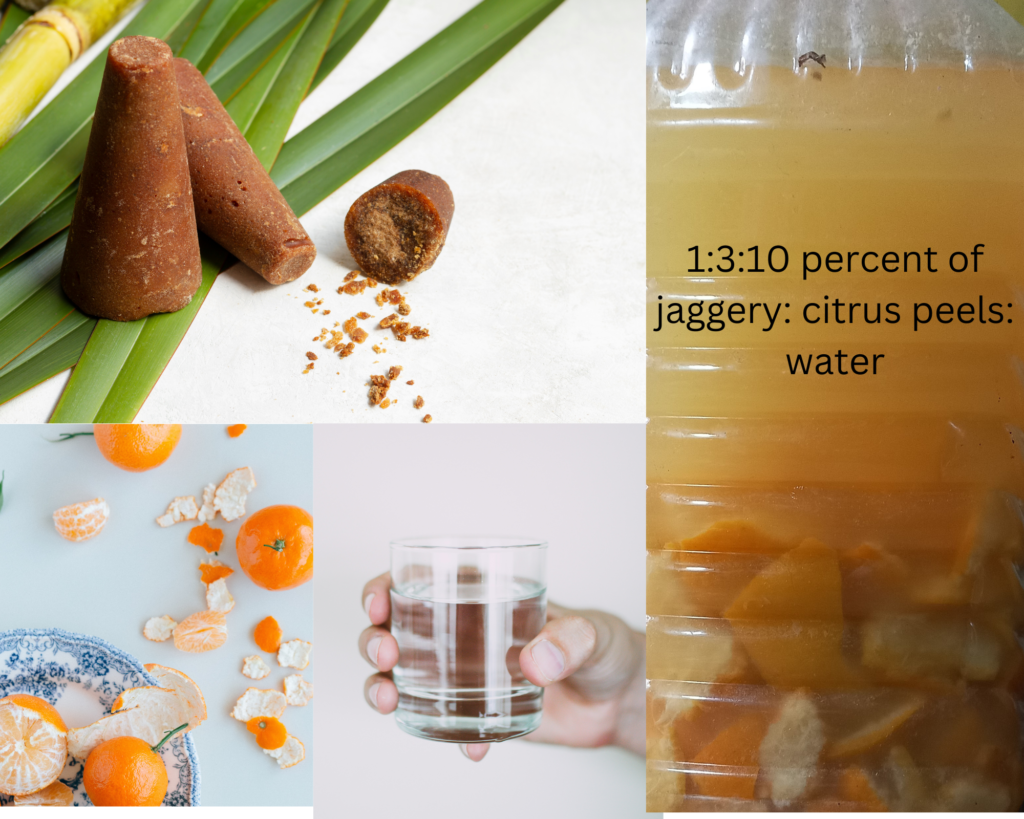Store-bought chemical cleaning products are effective at cleaning, but they come with health consequences. Most of the cleaning products contain harmful chemicals. These chemicals can irritate the eyes and lungs. It can also cause allergic reactions.
In this article, we will learn what an enzyme is, how to make it, and its uses in different areas. Read till the end to explore the various uses of bio-enzymes in day-to-day life.
I am so grateful to Dr. Rosukon Poompanvong from Thailand, who first introduced the bio enzyme. She aimed to convert organic waste into useful cleaning solutions that are safe for us and the planet.
Harmful effects of chemicals in cleaning products
According to the environmental working group, harmful chemicals like formaldehyde, 1,4-dioxane, chloroform, quaternary ammonium, benzalkonium chloride, and many other chemicals present in cleaning products can cause eye irritation, lung tissue damage, and breathing problems. The worst case is cancer.
The gases emitted from air fresheners and chemical cleaning solutions are known as volatile organic compounds or VOCs. Inhaling these toxins can lead to irritation in the eyes, nose, and throat and possibly cause cancer.
Because I was getting throat and eye irritation from the chemical cleaners, I have completely switched to bio enzyme cleaning solutions; they are safe for us and the planet.
Using bio enzymes promotes sustainable living, reduces organic waste, and reduces pollution.
What are Bio Enzymes?
Bio enzymes are fermented fruit juices; they contain enzymes that help break down fat, dirt, blood, etc. They are nature’s little helpers for effective cleaning.
In today’s world, living sustainably is important, and bio enzymes offer hope for eco-friendly cleaning. It provides a greener alternative to harsh chemical cleaning products.

Bio Enzymes uses.
1. Bathroom cleaning.
Take the strained bio enzyme diluted in water, pour it on the floor, spread it evenly, and leave it for half an hour. Scrub with the brush and clean, then wash with water.
2.Toilet cleaning.
For toilet cleaning grind the peels from the bio enzyme into a smooth paste, apply it to the toilet bowl, leave it for some time, then scrub with the brush and wash.
3.Floor cleaning.
Make enzymes from soap nuts, citrus peels, and rose petals; it will be best for cleaning and smell nice. You can also add your favorite essential oil for fragrance.
Use 50 ml of bio enzyme in half a bucket of water to mop the floor.
4.Laundry cleaning
For hand washing
For laundry cleaning, pour 100 to 150 ml of bio enzyme into half a bucket of water, then soak the cloth for half an hour. After soaking, scrub the clothes with a brush.
For tougher stains, use soap-nut bio enzymes, apply a little bit to the stain, and scrub to remove all the stains.
For machine washing
Add 100 ml of enzyme for a full load of clothes.
**Add them when the water is full in the drum; otherwise, it can stain the cloth.
5.Cleaning vessels
Are you tired of rough hands after washing vessels? This might be the best solution for you.
Make a thick paste from citrus peel enzymes, add some soap-nut solution, and use it for washing dishes.
Pro tip: If you are hand washing, apply enzyme to all the vessels, then wash them. Leaving them soaked in enzymes can effectively clean them.
6. Bio enzyme uses for plants.
Bio enzymes are the best fertilizer and pesticide for plants. Add 5 ml to 1 liter of water and keep it for some time or overnight for bacteria to multiply, then store it in a spray bottle and spray it on plants.
For soil fertility, use 10–15 ml of bio enzyme in half a bucket of water and give it to plants; it acts as a fertilizer.
Use any fruit and vegetable peels for making bio enzymes; they are the best fertilizer for plants that add nutrients.
7. Bio enzyme uses in agriculture and composting
Organic farming is gaining popularity because the chemicals present in pesticides are harmful to humans and soil health. Bio enzymes have live organisms that can help breakdown organic matter and help plants absorb nutrients.
Enzymes are cost-effective and help in sustainable and organic farming. Make enzymes using organic waste at home and use it for home gardening and even farmland.
Enzymes do not leave any harmful residues behind and do not pollute soil or water.
Bio enzymes are also used in composting because they can speed up the decomposition process.
In agriculture, bio enzymes are used as fertilizers and pesticides.
8. Bio enzyme uses for skin
Bio enzymes are a superfood for the skin, and they do not cause dryness or allergies.
Make enzymes using citrus peels, fruits, or aloe vera. Your skin will feel soft after using it. For foaming, you can make a soap nut enzyme and add it to the above enzyme.
Bio enzymes are a boon to the skin. You can use it to make body wash, face wash, hand wash, and shampoo.
Store-bought soaps have an alkaline pH and can cause skin dryness. Enzyme pH is acidic and is approximately equal to our skin pH.
9.Fruits cleaning
Fruits and vegetables get dirty during transportation and storage. Washing them is extremely important because they are contaminated with chemicals, pesticides, dirt, soil, and bacteria.
Take fruits and vegetables, add some enzymes and water, and soak them for some time, then wash them thoroughly.
10.Bio enzyme uses in kitchen cleaning
Bio enzyme is best at removing oil from stove tops, surfaces, and vessels.
Take 1:1 of enzyme and water in a spray bottle and use it to clean stove tops, tiles, and any hard surfaces.
11.Room freshener
Make bio enzyme from fresh flowers. It is a wonderful room freshener.
I have made an enzyme with rose petals; it smells amazing. Take a 1:3 ratio of bio enzyme and water to make room freshener.
12. Bio enzyme uses for Disinfecting home
Because bio enzymes are good at killing harmful bacteria, it is best to disinfect phones, floors, hands, and hard surfaces.
Add 10 ml of bio enzyme to 100 ml of water and store it in a bottle to use as a disinfectant.
13.Cleaning waterbodies
Bio enzymes are best at treating water bodies; they are effective at killing bad bacteria and neutralizing chemicals in wastewater.
Bio enzyme can be used to treat ponds, lakes, septic tanks, and hard water, as well as in industrial wastewater treatment. They offer cost-effective and safer options for cleaning water bodies.
14.Drains unclogging.
Enzymes are good at cleaning grease, oils, and organic matter. Pour them into the sink and leave them overnight, if possible, then boil the water and pour it. It will help to unclog a drain.
Always follow the manufacturer’s guidelines.
15.Household cleaning:
Use enzymes to clean any household products like fridges, washing machines, mirrors, and tables.
16.Cleaning jewelry
Soak your silver jewelry in an enzyme or soap nut solution and leave it for 1 to 2 hours, then scrub with the brush.
I soaked my silver anklet in bio-enzyme; after some time, all the dirt was automatically removed, and it took me a little effort to brush and wash.
Always do patch tests; different metals react differently with enzymes.
17.Automobile washing
There is no need to buy chemical cleaners for washing your car, bike, cycle, or auto. Simple: use a soap-nut solution for washing.
You can either make a soap solution or a bio enzyme.
18. Uses of bio enzymes in pest control
I sprayed enzymes on cockroaches, and it killed them. You can use them for pest control.
Those cockroach sprays contain harmful chemicals and smell very bad. They are very dangerous for our health and the environment, too.

There are different types of bio enzymes and their uses.
- Rose: It smells amazing, you can use it as a room freshener, and it can be added to other cleaning products for added fragrance.
- Neem: Use as a disinfectant, insect repellent, herbicide, and pesticide.
- Hibiscus: Excellent moisturizer used for making shampoo.
- Aloe vera: moisturizer and conditioner are used for making shampoo and face wash.
- Citrus: It is excellent for making cleaning products.
- Mixed fruits and vegetables: It is a very good fertilizer for plants.
- Soap nut: Add to all cleaning products for foaming and use for cleaning laundry, vessels, bathrooms, toilets, etc.
For personal care: shampoo, handwash, body wash, and face wash.
There are many uses of bio enzymes sky is the limit.
Make enzymes from fruits for making personal care products.
Ex: papaya.
Benefits of using bio enzymes
Eco-friendly Nature:
Don’t think they are natural cleaners; they won’t clean well. Bacteria present in them are superheroes at cleaning; you just need to give them some time to clean. They digest the organic matter and convert it into water and CO2.
The uses of bio enzymes became popular because of their safety and eco-friendly nature. Our mother earth gave us so much; it’s time we gave back. Bio enzymes break down naturally, leaving no harmful residues behind.
Chemical cleaners cause water, air, and soil pollution. They are not safe for our environment. These natural cleaners are biodegradable and do not release any harmful fumes into the air.
Bio enzymes promote sustainable and zero-waste living. The organic waste otherwise would have rotten and released methane gas into the atmosphere.
Cost-effectiveness:
Believe it or not, making your bio enzyme can save you a lot of money and protect you from chemical exposure.
Making enzymes costs much less compared to buying chemical cleaners from a store. One enzyme has many solutions; they are multipurpose, so you do not need to buy so many cleaners for different purposes.
Safety Aspects:
Bye-bye! to those chemical cleaning products! And say hi to natural cleaners. They are safe to make and effective for cleaning.
Chemical cleaners cause respiratory problems, allergies, and skin and eye irritation. You can be safe by using enzymes for cleaning at no additional cost for hospital visits due to the harmful chemicals present in cleaning products.
They are safe for kids and pets, too.

How to make bio enzymes.
Ingredients needed: jaggery, citrus peels, and water.
Step-by-step process
Take jaggery, citrus peels, and water in a 1:3:10 ratio and mix all of them in each ratio. Keep it for 3 months until your bio enzyme is ready to be cleaned.
Adding previous culture or yeast can help ferment faster; enzymes will be ready in one month.
Open the bottle once every day to release gases; it is better to use the wide-mouth container for making bio enzymes.
For detailed information, read my blog on how to make bio enzymes easily at home.
If you are unable to make them at home, you can check them online here
Safety Precautions and Handling
Storage: Store your bio enzymes in a cool, dark place. This ensures they remain potent and effective.
Handling Guidelines: Bio enzymes are safe to make and easy to handle. Always dilute bio enzymes before use. And remember, a little goes a long way!
Future Potential and Research
Ongoing Studies Researchers worldwide are exploring new uses of bio enzymes, from medical applications to sustainable energy solutions.
Who knows? The sky’s the limit!
In the future, bio enzymes might be used in everything from skincare to hair care to all cleaning products, as well as in composting, agriculture, and wastewater treatment.
The bottom line
The story is simple… Bio enzymes are our heroes. They help us with cleaning everything.
Their eco-friendly nature, coupled with their countless applications, makes them a game-changer in sustainability. Harmful chemicals present in cleaning products release VOC, which can cause eye, nose, and throat irritation. Bio-enzymes are easy to make and use. You can easily make them at home; they are effective and eco-friendly cleaning solutions. Have a greener and more sustainable life by making and using these miracle enzymes at home.
FAQs
- Are bio enzymes safe for pets?
Absolutely! Bio enzymes are gentle and non-toxic, making them safe for furry friends. You can even dilute enzymes in water and use them for cleaning ears and wounds.
- Can I use bio enzymes on all surfaces?
Mostly yes, but always do a patch test first to ensure compatibility.
- How long does a homemade bio-enzyme cleaner last?
Because they contain live bacteria, if they are stored properly, they can last for up to a year.
- Are there any side effects of using bio enzymes?
Not really. However, always follow safety guidelines to avoid any.
- Can bio enzymes replace traditional cleaning agents entirely?
While they offer a greener alternative, some situations might still require stronger.
Until further research, we need stronger chemicals for hospitals and public places because they are highly contaminated.
Resources
Image by Freepik, pexels.com
Am Jeenath is an engineer in biotech with a diploma in clinical research. I am the mother of a son. And I love helping people live sustainably. I educate people on sustainable living and share sustainability tips, ideas, brands, and DIYs.


Highly energetic article, I enjoyed that bit. Will there be
a part 2? https://Tri1ls.webflow.io/
Your article helped me a lot, is there any more related content? Thanks! https://www.binance.com/tr/register?ref=W0BCQMF1
Thank you.